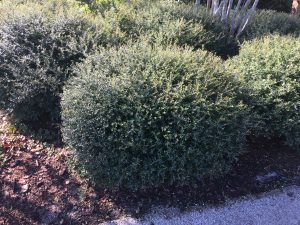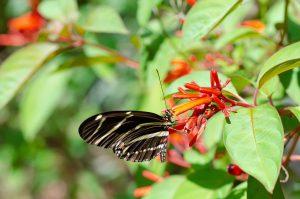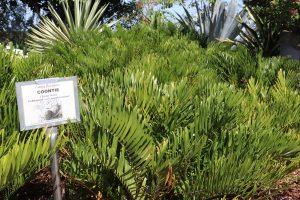Watch our Gardening with Native Plants webinar with Tia Silvasy, UF/IFAS Extension and Anita Camacho, Little Red Wagon Native Nursery
What is a native plant?
Let’s start with a few definitions. A native plant is one that has been documented to exist in Florida before European contact. A non-native plants has been introduced from other parts of the world after European contact. There are also invasive plants, which are defines as a non-native plant that is harmful to our environment. Common invasive plants in Florida include Brazilian pepper, air potato, and cogon grass. One more category is the nativar, a cultivar of a native plant species, that has been bred for improved shape or other qualities for urban landscapes. Examples of nativars include dwarf holly (Ilex vomitoria ‘Schillings’), Walter’s viburnum (Viburnum obovatum ‘Densa’), and ‘Little Gem’ magnolia.

Benefits of Native Plants
Native plants are extremely important in our environment because they provide food and shelter for our wildlife. They have co-evolved with other native bees, butterflies, birds, and wildlife. Some specialist insects only feed or lay their eggs on certain plants. Additionally, Florida native plants are well-suited for our climate and soils and often need less inputs (fertilizer and irrigation) than nonnative plants. However, they still being planted with the right plant in the right place. Using natives can bring life to your garden and help create more biodiverse and resilient landscapes.
Native Plants for Bees, Butterflies, and Birds
There is a saying “If something is not eating your plant, it is not part of the ecosystem”. Natives help to create a healthy ecosystems and you will know your garden is a success when you see insects flying around and wildlife visiting your plants. To attract butterflies, use native larval host plants including milkweed for monarchs, passionvine for fritillaries and longwing butterflies, frogfruit for white peacock butterflies, oaks for hairstreak butterflies, and twinflower for the buckeye butterfly. Some great native nectar plants for bees and butterflies include coreopsis, phlox, black-eyed Susan, goldenrod, beach dune sunflower, red salvia, porterweed and lantana. Bees prefer flat flowers that produce abundant pollen and nectar. Birds go for shrubs and small trees with fruits or berries, such as beautyberry, firebush and sea grape.

Getting Started with Native Plants
Florida native plants are not commonly sold at big box stores, you can find them at native plant nurseries. The Real Florida Gardeners Guide has a list of Florida native nurseries that is published each year by FANN.org. Seeds can be purchased online from the Florida Wildflower Growers Cooperative. Do not collect native plants from the wild because that is illegal unless you have a permit. You can also save seeds or make cuttings of your plant and trade with your friends. In addition to flowering plants, you can add some bulletproof native plants to fill your landscape. Plants such as sunshine mimosa, coontie, mulhy grass, saw palmetto, holly and magnolia live for many years and are easy to grow.

Resources
Real Florida Gardeners Guide lists native nurseries
Guide for Choosing Native Plants by Florida Wildflower Foundation
Pruning Notes for Native Plants by Grounded Solutions
Getting into the “Weeds:” An Introduction to Common Lawn Plants and Their Ecological Benefits
Attracting Butterflies with Wildflowers by Florida Wildflower Foundation
If you have any questions, please contact the UF/IFAS Extension Hillsborough County at 813-744-5519 or email hillsmg@mail.ufl.edu.
Follow Us!
We have several ways to connect. Join our UF/IFAS Extension Hillsborough County
Facebook, Florida-Friendly Facebook, YouTube, Instagram, Eventbrite, Blogs, Website
The University of Florida is an Equal Opportunity Institution.
 7
7
